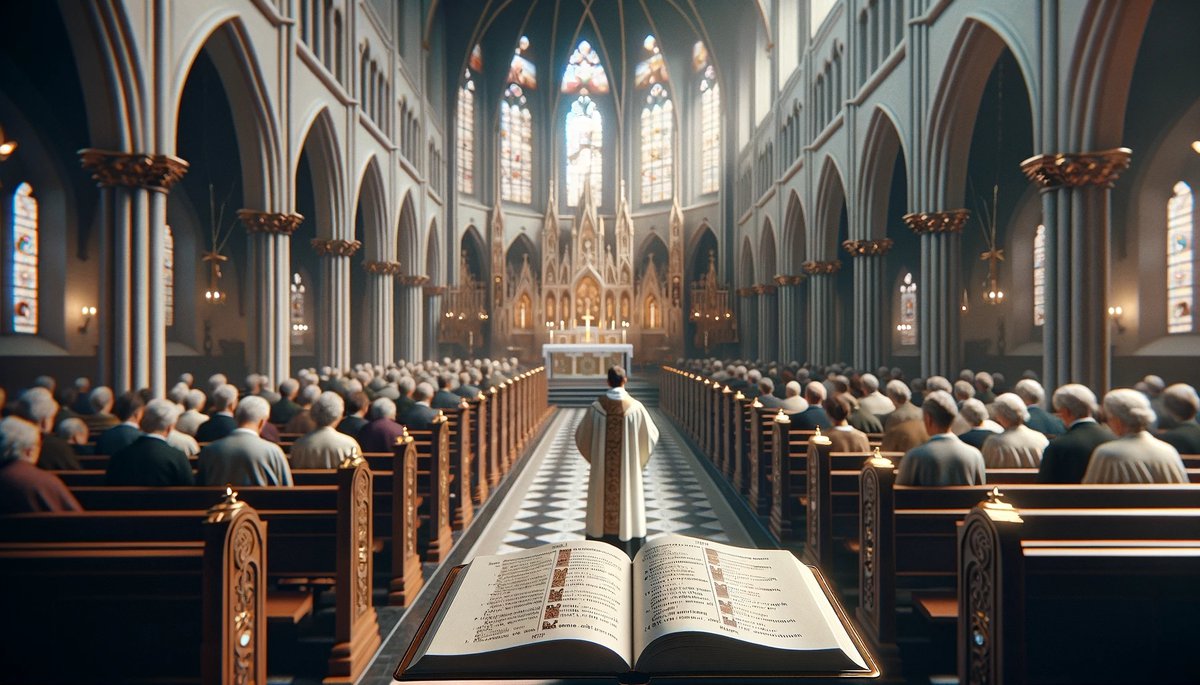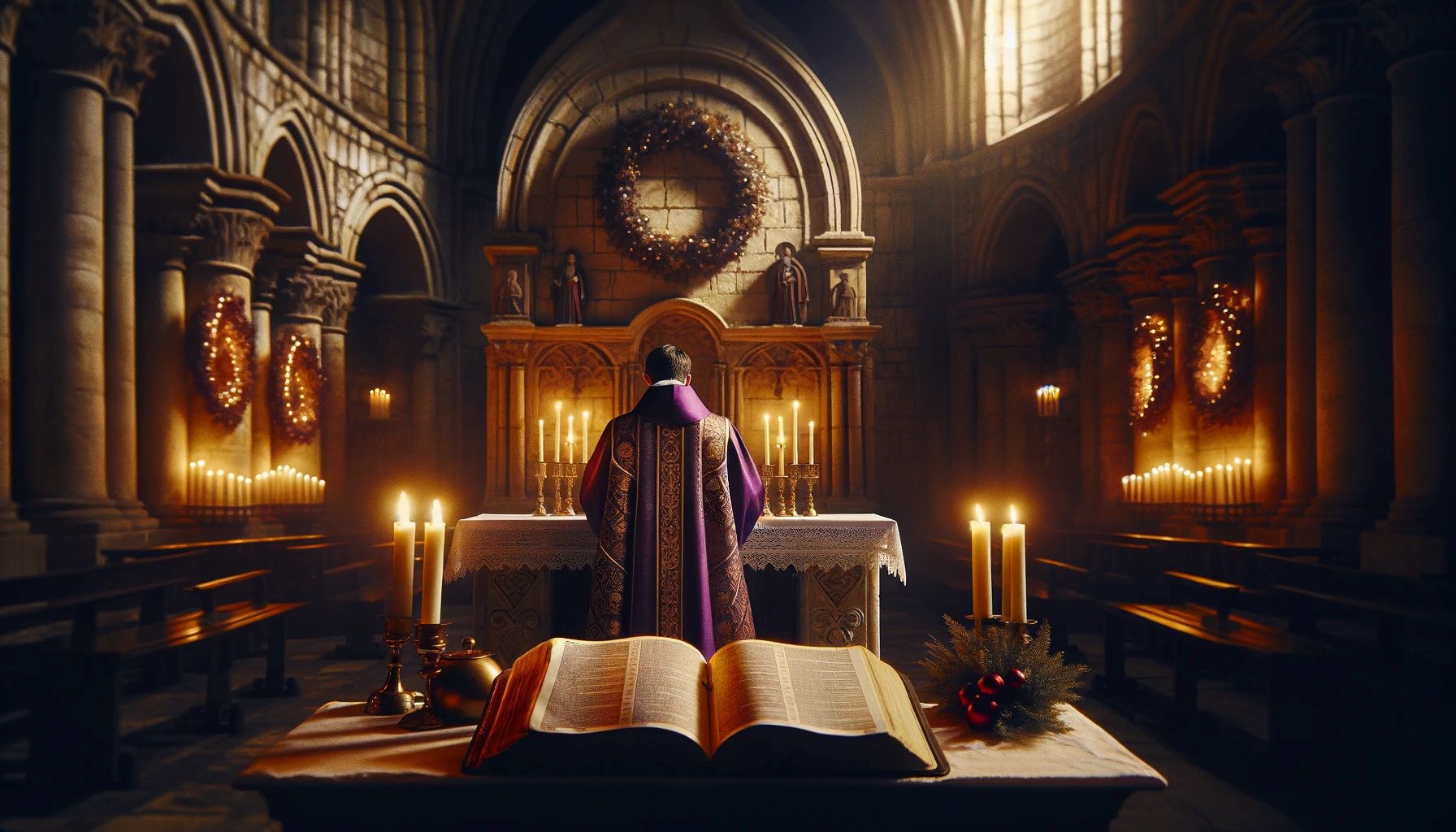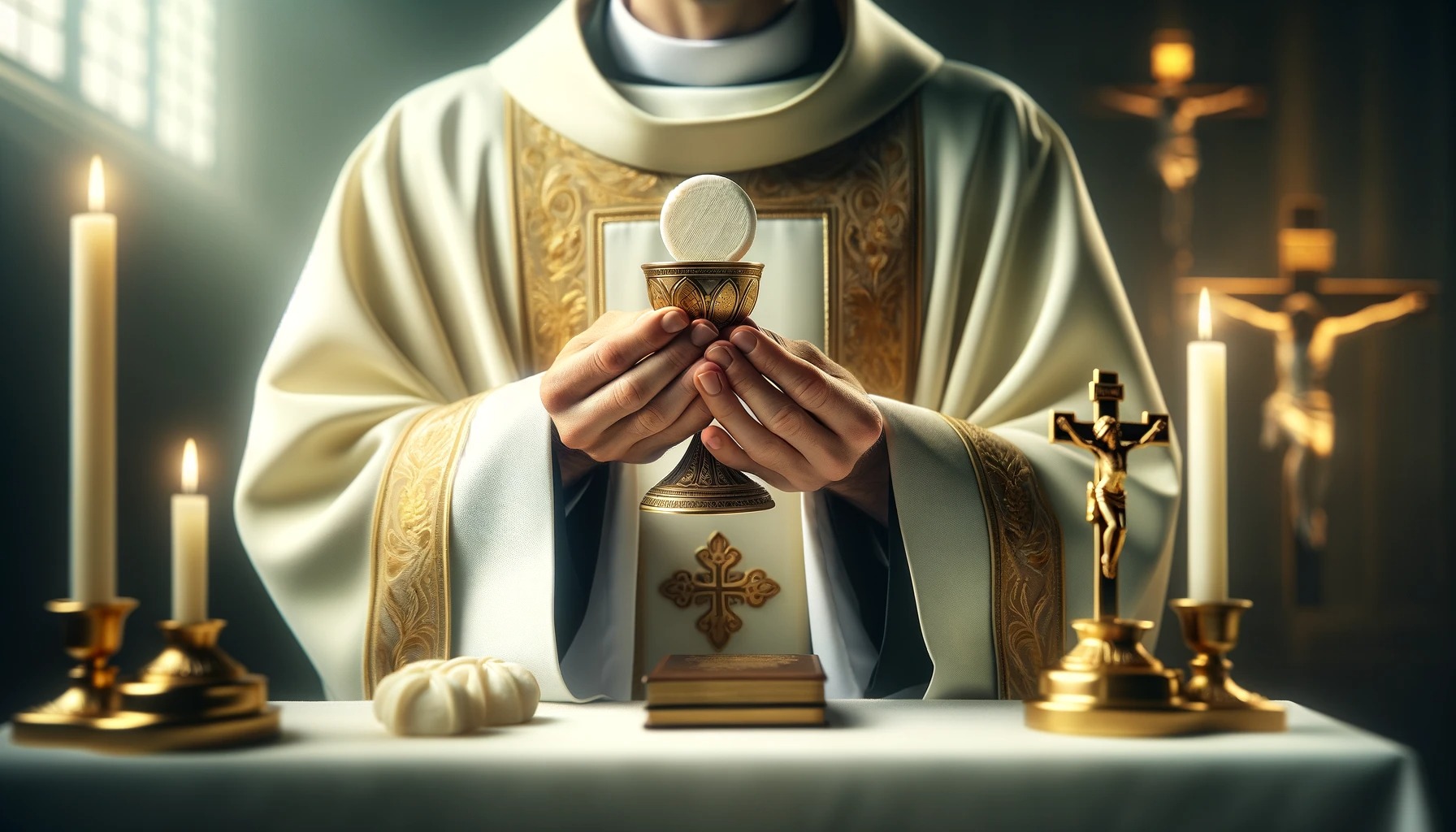Home>Special Themes>What Is Omitted From Mass During Advent


Special Themes
What Is Omitted From Mass During Advent
Published: February 12, 2024
Ericka Andersen, an editor at Christian.net, expertly merges digital strategy with content creation, focusing on faith and societal issues. Her communication skills enhance the platform's engaging narratives, fostering meaningful dialogue on belief's impact on society.
Learn about what is omitted from mass during Advent and the special themes observed during this liturgical season. Explore the significance of these omissions and themes. Discover more about Advent traditions and practices.
(Many of the links in this article redirect to a specific reviewed product. Your purchase of these products through affiliate links helps to generate commission for Christian.net, at no extra cost. Learn more)
Table of Contents
Introduction
Advent, the period leading up to Christmas, is a time of anticipation and preparation in the Christian liturgical calendar. It marks the beginning of the Church year and is a season of both reflection and expectation. During this sacred time, Christians around the world engage in spiritual practices and observances that are deeply rooted in tradition and faith.
The significance of Advent extends beyond the commercialized aspects of the holiday season, reminding believers of the profound spiritual journey that culminates in the celebration of the birth of Jesus Christ. It serves as a time of spiritual renewal, a period to rekindle hope, and a season to embrace the promise of redemption.
As we delve into the essence of Advent, it is essential to understand the historical and spiritual underpinnings that have shaped this sacred season. From its origins to its contemporary relevance, Advent embodies a rich tapestry of customs, rituals, and theological significance that resonate deeply with the faithful.
Throughout this article, we will explore the historical roots of Advent, the purpose it serves within the Christian tradition, and the specific elements that are omitted from Mass during this season. By delving into these aspects, we aim to gain a comprehensive understanding of the spiritual significance of Advent and how it shapes the collective faith experience of believers worldwide.
Read more: What Prayer Of Mass Is Omitted During Lent
The History of Advent
The history of Advent can be traced back to the early centuries of Christianity, with its roots firmly embedded in the traditions of the Western Church. The word "Advent" originates from the Latin word "adventus," meaning "coming" or "arrival." This season marks the anticipation of the coming of Jesus Christ, not only in commemoration of his birth but also in anticipation of his second coming.
The origins of Advent can be linked to the 4th and 5th centuries when the Church Fathers sought to establish a period of spiritual preparation preceding the celebration of Christ's nativity. Initially, Advent was a time of fasting and penitence, mirroring the solemnity of the Lenten season. It was a period of reflection, prayer, and repentance, serving as a spiritual counterpart to the joyous festivities of Christmas.
Over time, the observance of Advent evolved, incorporating a blend of religious customs and cultural practices. The liturgical color associated with Advent, purple or blue, symbolizes penance, preparation, and royalty, reflecting the dual nature of this season as a time of solemn reflection and joyful anticipation.
The structure of Advent as a four-week period emerged in the 6th century in Gaul (modern-day France), and by the Middle Ages, the observance of Advent had become firmly established in the liturgical calendar of the Western Church. The themes of hope, peace, joy, and love became integral to the Advent season, with each week dedicated to the contemplation of these fundamental aspects of Christian faith.
The historical significance of Advent is also intertwined with the development of Advent wreaths and calendars, which have become iconic symbols of this season. The Advent wreath, adorned with candles representing the weeks of Advent, serves as a visual reminder of the gradual illumination of the world by the light of Christ. Similarly, the Advent calendar, with its daily countdown to Christmas, captures the spirit of anticipation and expectation that defines this sacred time.
As the centuries unfolded, Advent retained its foundational elements while adapting to the evolving cultural and religious landscape. Today, the observance of Advent continues to hold a central place in the liturgical traditions of numerous Christian denominations, serving as a poignant reminder of the enduring significance of Christ's coming and the timeless message of hope and redemption.
In understanding the history of Advent, we gain insight into the enduring legacy of this sacred season and the profound spiritual journey it offers to believers across generations.
The Purpose of Advent
The purpose of Advent extends far beyond the anticipation of Christmas Day. It serves as a profound period of spiritual preparation, inviting believers to engage in introspection, anticipation, and contemplation. At its core, Advent embodies a dual sense of reflection and expectation, intertwining the historical significance of Christ's birth with the anticipation of his second coming.
One of the central purposes of Advent is to foster a sense of spiritual readiness. As believers journey through the four weeks of Advent, they are called to reflect on the profound implications of Christ's incarnation and the transformative impact of his presence in their lives. This period of reflection encourages individuals to examine their spiritual journey, seek reconciliation, and embrace a renewed sense of faith and hope.
Moreover, Advent serves as a poignant reminder of the enduring message of hope and redemption. The themes of hope, peace, joy, and love, symbolized by the Advent wreath, guide believers through a season of contemplation and anticipation. Each week offers an opportunity to delve into these foundational aspects of Christian faith, nurturing a sense of spiritual renewal and fortitude.
Additionally, Advent underscores the significance of patience and perseverance. In a world often characterized by haste and instant gratification, the deliberate pace of Advent encourages believers to embrace patience and await the fulfillment of God's promises. This season serves as a counterbalance to the frenetic pace of modern life, inviting individuals to cultivate a spirit of patience and trust in the divine unfolding of God's plan.
Furthermore, Advent fosters a sense of communal solidarity and shared anticipation. As believers gather in churches and homes to light the Advent candles, engage in prayers, and partake in spiritual observances, they form a collective bond rooted in the shared anticipation of Christ's coming. This communal aspect of Advent reinforces the interconnectedness of the faithful and underscores the universal significance of Christ's birth.
In essence, the purpose of Advent transcends mere observance; it embodies a profound spiritual journey that calls believers to embrace introspection, anticipation, and communal solidarity. Through its rich tapestry of traditions and themes, Advent continues to inspire and uplift believers, offering a timeless message of hope, renewal, and the enduring promise of Christ's presence in their lives.
What Is Omitted from Mass During Advent
During the season of Advent, the liturgy undergoes subtle yet significant changes, reflecting the solemnity and anticipation that characterize this sacred time. One notable aspect of these changes is the omission of certain elements from the Mass, underscoring the distinctive nature of Advent within the liturgical calendar.
Omission of the Gloria
One prominent omission during Advent is the exclusion of the Gloria, a hymn of praise and adoration that is traditionally sung or recited during Mass. The absence of the Gloria during Advent serves as a deliberate departure from the jubilant expressions of praise, aligning the liturgy with the reflective and penitential spirit of the season. By refraining from the Gloria, the Church emphasizes the solemn anticipation of Christ's coming, inviting the faithful to engage in a period of introspection and spiritual preparation.
Read more: What Prayer Is Omitted During Lent
Omission of Alleluia
Similarly, the omission of the Alleluia, a joyful exclamation of praise, further underscores the distinctive character of Advent. The temporary absence of this exuberant expression of praise serves as a poignant reminder of the solemnity and restraint that define this season. By refraining from the Alleluia, the liturgy evokes a sense of longing and anticipation, directing the focus of the faithful towards the imminent arrival of Christ.
The Significance of Omitting Certain Elements
The deliberate omission of the Gloria and Alleluia from the Mass during Advent serves as a symbolic expression of the Church's reverence for the profound mystery of the Incarnation. By abstaining from these exultant expressions of praise, the liturgy creates a space for contemplation and spiritual introspection, guiding believers towards a deeper appreciation of the redemptive significance of Christ's birth.
Embracing the Changes During Advent
As the Mass undergoes these intentional omissions, believers are invited to embrace the changes with a spirit of reverence and anticipation. The absence of the Gloria and Alleluia serves as a poignant reminder of the sacred journey towards Christmas, prompting the faithful to engage in a period of spiritual readiness and expectation. By participating in the adapted liturgy of Advent, believers are called to immerse themselves in the contemplative atmosphere of the season, allowing the omissions to deepen their connection to the profound mystery of Christ's coming.
In essence, the omission of certain elements from the Mass during Advent underscores the unique spiritual character of this season, inviting believers to embrace a period of solemn anticipation and reflection as they prepare to celebrate the birth of Jesus Christ.
The Significance of Omitting Certain Elements
The deliberate omission of the Gloria and Alleluia from the Mass during Advent holds profound significance within the liturgical context, serving as a poignant expression of the Church's reverence for the sacred mysteries of the Incarnation and the anticipation of Christ's coming. By abstaining from these exultant expressions of praise, the liturgy creates a space for contemplation and spiritual introspection, guiding believers towards a deeper appreciation of the redemptive significance of Christ's birth.
The omission of the Gloria, a hymn of praise and adoration, resonates with the overarching theme of solemn anticipation that defines the Advent season. By refraining from the exuberant proclamation of the Gloria, the Church invites the faithful to enter into a period of introspective reverence, acknowledging the profound mystery of the Word made flesh. This intentional omission underscores the solemnity of the season and directs the focus of the faithful towards the imminent arrival of Christ, prompting a sense of spiritual readiness and expectation.
Similarly, the absence of the Alleluia, a joyful exclamation of praise, reinforces the contemplative nature of Advent. The temporary omission of this exultant expression serves as a poignant reminder of the restrained and reflective character of the season. By refraining from the Alleluia, the liturgy evokes a sense of longing and anticipation, inviting believers to embrace a spirit of patient expectation as they prepare to commemorate the birth of Jesus Christ.
Moreover, the omission of these elements from the Mass during Advent underscores the profound theological tension between the already and the not yet—the acknowledgment of Christ's historical coming and the eager anticipation of his eschatological return. This tension is encapsulated in the spirit of Advent, where believers are called to dwell in the intersection of past, present, and future, embracing the redemptive significance of Christ's birth while ardently awaiting the fulfillment of God's promises.
In essence, the deliberate omission of the Gloria and Alleluia from the Mass during Advent serves as a poignant expression of the Church's reverence for the profound mystery of the Incarnation and the anticipation of Christ's coming. It invites believers to engage in a period of spiritual introspection, fostering a deeper understanding of the redemptive significance of Christ's birth and the enduring promise of his second coming.
Read more: During Advent What Do We Pray For
How to Embrace the Changes During Advent
Embracing the changes during Advent entails cultivating a spirit of reverence, anticipation, and introspection as believers journey through this sacred season. As the liturgy undergoes intentional omissions and the spiritual atmosphere shifts towards solemn anticipation, there are several meaningful ways in which individuals can wholeheartedly embrace these changes and deepen their connection to the profound significance of Advent.
First and foremost, embracing the changes during Advent involves approaching the adapted liturgy with a spirit of openness and receptivity. Rather than viewing the omissions as mere alterations to the familiar order of Mass, believers are encouraged to perceive them as deliberate invitations to engage in a period of spiritual readiness and expectation. By embracing the adapted liturgy with a sense of reverence, individuals can immerse themselves in the contemplative atmosphere of the season, allowing the omissions to deepen their connection to the profound mystery of Christ's coming.
Furthermore, embracing the changes during Advent calls for a deliberate cultivation of patience and reflection. As the Gloria and Alleluia are temporarily omitted from the Mass, believers are invited to embrace a spirit of patient expectation, acknowledging the solemn anticipation that defines this season. This period of intentional restraint serves as an opportunity for individuals to engage in introspective reflection, contemplating the redemptive significance of Christ's birth and the enduring promise of his second coming. By fostering a spirit of patience and reflection, believers can fully embrace the changes in the liturgy and allow them to deepen their spiritual journey through Advent.
Additionally, embracing the changes during Advent involves actively participating in the rich tapestry of traditions and observances that define this season. From lighting the Advent wreath to engaging in prayers and spiritual reflections, believers are called to immerse themselves in the communal solidarity and shared anticipation that characterize Advent. By actively participating in these traditions, individuals can forge a deeper connection to the collective faith experience of the Church, embracing the changes in the liturgy as integral components of a shared spiritual journey.
In essence, embracing the changes during Advent is a multifaceted endeavor that encompasses reverence, patience, introspection, and active participation in the traditions of the season. By approaching the adapted liturgy with an open heart and a spirit of anticipation, believers can fully immerse themselves in the profound spiritual journey that Advent offers, allowing the intentional omissions to deepen their connection to the timeless message of hope, renewal, and the enduring promise of Christ's presence in their lives.
Conclusion
In conclusion, the season of Advent embodies a profound tapestry of tradition, faith, and spiritual significance within the Christian liturgical calendar. From its rich historical roots to its contemporary relevance, Advent serves as a poignant reminder of the enduring message of hope, renewal, and the anticipation of Christ's coming. The deliberate omissions from the Mass during Advent, including the Gloria and Alleluia, underscore the distinctive character of this season, inviting believers to engage in a period of solemn anticipation and reflection as they prepare to celebrate the birth of Jesus Christ.
As we reflect on the significance of Advent, it becomes evident that this season offers a unique opportunity for believers to embrace a spiritual journey characterized by introspection, anticipation, and communal solidarity. The deliberate omissions from the Mass serve as symbolic expressions of the Church's reverence for the profound mystery of the Incarnation and the anticipation of Christ's coming, guiding believers towards a deeper appreciation of the redemptive significance of Christ's birth.
Embracing the changes during Advent entails cultivating a spirit of reverence, patience, and active participation in the traditions of the season. By approaching the adapted liturgy with an open heart and a spirit of anticipation, believers can fully immerse themselves in the profound spiritual journey that Advent offers, allowing the intentional omissions to deepen their connection to the timeless message of hope, renewal, and the enduring promise of Christ's presence in their lives.
Ultimately, the season of Advent serves as a poignant reminder of the enduring significance of Christ's coming and the timeless message of hope and redemption. As believers journey through the four weeks of Advent, they are called to reflect on the profound implications of Christ's incarnation and the transformative impact of his presence in their lives. This period of reflection encourages individuals to examine their spiritual journey, seek reconciliation, and embrace a renewed sense of faith and hope, fostering a deeper understanding of the redemptive significance of Christ's birth and the enduring promise of his second coming.
In essence, Advent beckons believers to embrace a period of spiritual renewal, a time to rekindle hope, and a season to embrace the promise of redemption. It is a season that transcends the commercialized aspects of the holiday, reminding believers of the profound spiritual journey that culminates in the celebration of the birth of Jesus Christ.













